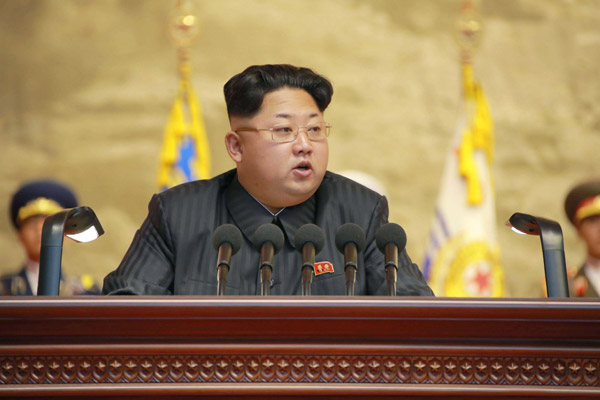 |
|
Photo provided by Korean Central News Agency (KCNA) on July 26, 2015 shows top leader of the Democratic People's Republic of Korea (DPRK) Kim Jong-un making a congratulatory speech at the 4th National Conference of War Veterans on July 25, 2015. [Photo/Xinhua/KCNA] |
On Thursday, Kim Yong-un, the leader of the Democratic People's Republic of Korea was quoted by the Korean Central News Agency as saying his state is ready to defend its sovereignty and dignity with hydrogen bombs it had developed itself. That made headlines worldwide.
But in fact, the possibility of the DPRK owning hydrogen bombs is rather low. To produce a hydrogen bomb, a state needs very high technologies and good supporting industries, which the DPRK does not have. Besides, it would be impossible to test a hydrogen bomb without it being known. Some may argue that tests can be simulated on computers, but the DPRK has no such high-speed computer with which to carry out such simulations.
The DPRK may have certain nuclear abilities, such as the first-generation atom bombs used during WWII that do not require top technologies. Though the DPRK has been doing research on these over the past several decades, hydrogen bombs require much higher technologies and the DPRK does not have these.
Yet that is no reason to underestimate the DPRK's nuclear abilities, and the DPRK is constantly reminding others of its willingness to use nuclear weapons in a war.
The DPRK might not be able to attack the United States with nuclear weapons, but it can still pose a threat to the Republic of Korea. And it may seriously change the geopolitical pattern of Northeast Asia. Japan and the ROK might pursue nuclear weapons to balance the threat.
The US has been trying to hinder Japan and the ROK from pursuing nuclear weapons because that would challenge the US' own strategic influence in the region. But even if Japan and the ROK give up the idea under pressure from the US, the existence of nuclear weapons in the DPRK poses a security threat to all its neighbors, including China. The nuclear disasters at Chernobyl in 1986 and in Fukushima in 2011 are still fresh in memory and there is no reason to expect the DPRK can do better in terms of its nuclear management.
China has made it crystal clear that it is strongly against the nuclearization of the Korean Peninsula. Currently the Six-Party Talks aimed at resolving the nuclear issue on the Korean Peninsula are at a standstill, because of the lack of trust between the US and the ROK on one side and the DPRK on the other. The DPRK believes that nuclear weapons are an important tool for it to maintain its sovereignty and national security; it will hopefully change its mind if it can attain better economic growth.
There are examples in history: Kazakhstan gave up the nuclear weapons stationed by the Soviet Union on its soil, and South Africa gave up developing its own nuclear weapons. They realized that nuclear weapons would not help promote their security.
The US and the ROK should positively respond to the security concerns of the DPRK to prevent it from making any misjudgment.
That in turn requires the US and the ROK help the DPRK prosper instead of putting more pressure on it. Only when the DPRK can achieve economic growth will it give up nuclear weapons and that's where the US and the ROK should render their efforts.
The author is an associate professor on Korea Peninsula studies at Fudan University.

I’ve lived in China for quite a considerable time including my graduate school years, travelled and worked in a few cities and still choose my destination taking into consideration the density of smog or PM2.5 particulate matter in the region.